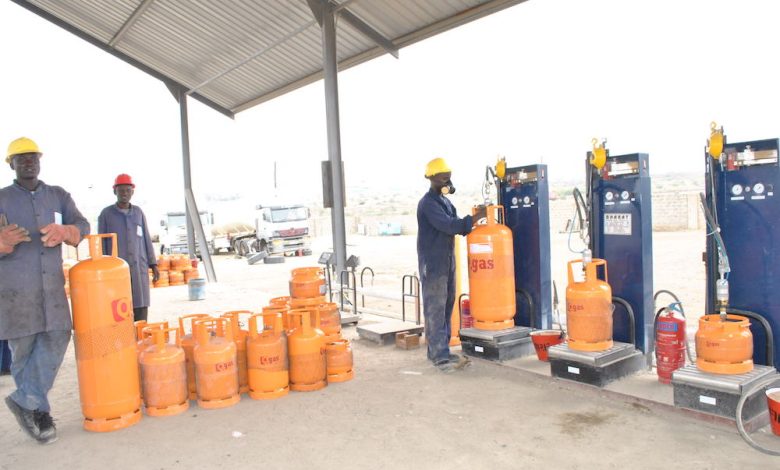The rising price of Liquefied Petroleum Gas (LPG) in Nigeria, currently reaching as high as N1,500/kg in some areas, is becoming a major concern for many households that rely on it for cooking. This sharp increase, from around N11,735 for a 12.5kg cylinder in January 2024 to N17,000 in October, reflects broader market trends, inflationary pressures, and the heavy reliance on imported gas, with over 60% of LPG in Nigeria coming from abroad.
It was confirmed that the prices of cooking gas peaked at N1,500/kg in some retail outlets in Ogun and Lagos States as of Sunday.
In Abuja, the average price for refilling a 12.5kg cylinder of cooking gas has increased by 41.6 per cent to N17,000 in different areas.
The reports that the same commodity sold for N12,000 in July and N11,735 in January 2024.
This sharp price rise reflects ongoing trends in the market and may have implications for consumers, many of whom rely on LPG for their daily cooking needs.
Despite government efforts and promises, such as those made by the Minister of State for Petroleum Resources (Gas), Ekperikpe Ekpo, to reduce LPG costs by engaging regulators and gas producers, the market survey suggests that prices continue to rise. As a result, some Nigerians may be forced to switch to alternatives like charcoal for cooking, especially as costs put more pressure on household budgets.
Suresh Kumar, the Managing Director of NIPCO Plc, pointed out that local production remains insufficient, emphasizing that domestic refineries like Dangote’s and Chevron’s conversion of propane to LPG could play a crucial role in reducing prices. However, for now, the challenges of import dependency and global pricing pressures are driving the ongoing increase in LPG costs, exacerbating the energy affordability crisis in Nigeria.
However, a new market survey conducted by our correspondent on Sunday revealed that the price has not decreased; instead, it has risen even further.
An analysis showed that the product currently sells for N17,000 in Lokogoma area of the FCT, an increase of 41.6 per cent from N12,000 vendors sold to customers three months ago. This means one kilogram of gas was sold for N1,400.
In Kubwa, the product was sold between N16,200 and N16,500 from N12,000 previously charged. But in the outskirt area of Bwari, Kurudu and Jikwoyi, the product sold for N1,300.
Some major distributors still sell the product between N1,300 and N1,400 depending on the location.
The Commissioner for Environment in Ogun State, Ola Oresanya, once told one of our correspondents that many might resort to charcoal for cooking if the price of LPG continues to rise.
However, speaking at the just-concluded National Conference of the Nigerian Association of Liquefied Petroleum Gas Marketers 2024, held in Lagos, Kumar, revealed that local production of LPG remains inadequate, urging the Federal Government to encourage Chevron to convert more of its propane output into propane.
“Currently, less than 40 per cent of the 1.5 million metric tonnes consumed domestically is produced locally. This is why the government must encourage companies like Chevron to convert more of their propane output into butane, which is more suitable for domestic use,” he explained.
Responding to questions about the rising cost of LPG amid a blend of local and imported supply, the managing director expressed optimism that prices would decline as domestic production improves, especially as the local refineries source crude oil locally.
“With the Dangote refinery and other refineries now sourcing crude oil in local currency, the volume of LPG produced locally is expected to increase, which will, in turn, drive down the price of the commodity,” the MD explained.
The managing director of NIPCO (Nigeria’s Independent Petroleum Company) highlights the importance of increasing local production of liquefied petroleum gas (LPG) to meet domestic demand and reduce reliance on imports. Currently, only about 40% of the 1.5 million metric tonnes of LPG consumed annually in Nigeria is produced locally. To address this, the government is encouraged to support initiatives like converting more propane into butane, which is more suitable for domestic use, and to incentivize investments in gas processing infrastructure.
With the Dangote refinery and other local refineries sourcing crude oil domestically, LPG production is expected to increase, potentially lowering costs. The MD explained that the rising cost of LPG is partly due to reliance on imports, and with increased local production, prices could stabilize as exposure to foreign exchange rates and international markets lessens.
NIPCO, which has been operating since 2004, has grown significantly in the LPG sector, expanding its infrastructure to handle larger volumes of production. The MD stressed the importance of capturing flared gas and processing it to boost domestic supply, aiming to increase Nigeria’s LPG consumption beyond the current 1.5 million MT to about 5 million MT annually. He also mentioned the role of compressed natural gas (CNG) in powering industries and transportation.
The MD believes that with proper government support, particularly for local refineries like the Dangote Refinery, LPG prices could become more affordable, increasing accessibility for the Nigerian population and promoting sustainable growth in the energy sector.
Click here to join our Telegram Channel

